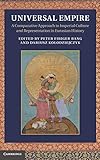Universal empire : a comparative approach to imperial culture and representation in Eurasian history / edited by Peter Fibiger Bang and Dariusz Kolodziejczyk.
Material type: TextPublisher: Cambridge, England ; New York : Cambridge University Press, 2012Copyright date: ©2012Description: xx, 378 pages : illustrations ; 24 cmContent type: text Media type: unmediated Carrier type: volumeISBN: 9781107022676Subject(s): Imperialism -- History | Kings and rulers -- History | Imperialism -- Social aspects -- History | Imperialism -- Philosophy | Political culture -- History | Civilization -- History | World history | World politics -- To 1900 | HISTORY / Ancient / General | Eurasia -- History | Eurasia -- Politics and governmentDDC classification: 306.2 LOC classification: JV61 | .U64 2012Other classification: HIS002000
TextPublisher: Cambridge, England ; New York : Cambridge University Press, 2012Copyright date: ©2012Description: xx, 378 pages : illustrations ; 24 cmContent type: text Media type: unmediated Carrier type: volumeISBN: 9781107022676Subject(s): Imperialism -- History | Kings and rulers -- History | Imperialism -- Social aspects -- History | Imperialism -- Philosophy | Political culture -- History | Civilization -- History | World history | World politics -- To 1900 | HISTORY / Ancient / General | Eurasia -- History | Eurasia -- Politics and governmentDDC classification: 306.2 LOC classification: JV61 | .U64 2012Other classification: HIS002000 | Item type | Current library | Call number | Status | Date due | Barcode |
|---|---|---|---|---|---|
 Books
Books
|
The BIAA David H. French Library Shelf 61 - Reading Room | H2m BANG 30325 | Not for loan | BOOKS-000000023244 |
Includes bibliographical references (pages 310-363) and index.
Machine generated contents note: 1. 'Elephant of India' - universal empire through time and across cultures / Peter Fibiger Bang with Dariusz Kołodziejczyk; Part I. Eurasia - Antiquity till Early Modernity: 2. Propaganda and practice in Assyrian and Persian imperial culture / Gojko Barjamovic; 3. Between Aśoka and Antiochos - an essay in world history on universal kingship and cosmopolitan culture in the Hellenistic ecumene / Peter Fibiger Bang; 4. The making of Oriental Rome: shaping the Trojan legend / Rolf Michael Schneider; 5. Pseudo-Aristotelian politics and theology in universal Islam / Garth Fowden; 6. The Christian imperial tradition, Greek and Latin / Judith Herrin and Dimiter Angelov; 7. Khan, Caliph, Tsar and Imperator: the multiple identities of the Ottoman Sultan / Dariusz Kołodziejczyk; 8. How the Mughal Padshahs referenced Iran in their visual construction of universal rule / Ebba Koch; 9. Ideologies of state building in Vijayanagara and Post-Vijayanagara South India: some reflections / Velcheru Narayana Rao and Sanjay Subrahmanyam; 10. Sons of Heaven: the Qing appropriation of the Chinese model of universal empire / Evelyn S. Rawski; Part II. Contrasting Universalisms - Old and New World; 11. Aztec universalism: ideology and status symbols in the service of empire-building / Justyna Olko; 12. From empire to Commonwealth(s) - orders in Europe, 1300-1800 / Peter Haldén; 13. Imperial universalism - further thoughts / John A. Hall.
"The claim by certain rulers to universal empire has a long history stretching as far back as the Assyrian and Achaemenid empires. This book traces its various manifestations in Near Eastern and classical antiquity, the Islamic world, Asia and Central America as well as considering seventeenth- and eighteenth-century European discussions of international order. As such it is an exercise in comparative world history combining a multiplicity of approaches, from ancient history, to literary and philosophical studies, to the history of art and international relations, and historical sociology. The notion of universal, imperial rule is presented as an elusive and much coveted prize among monarchs in history, around which developed forms of kingship and political culture. Different facets of the phenomenon are explored under three, broadly conceived, headings: symbolism, ceremony and diplomatic relations; universal or cosmopolitan literary high-cultures; and, finally, the inclination to present universal imperial rule as an expression of cosmic order"-- Provided by publisher.
